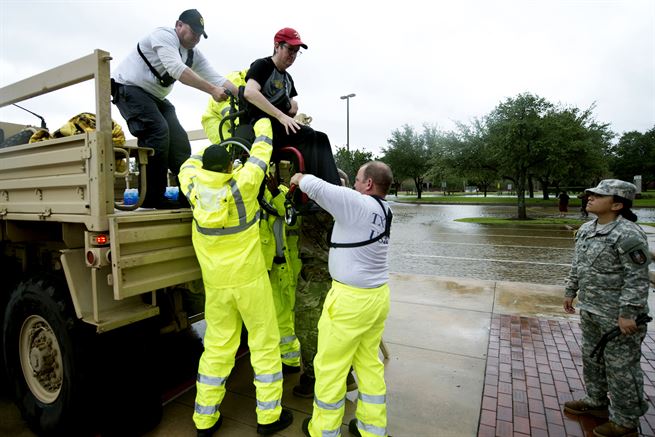In the dead center of Hurricane Season, my mom and I made the astute decision to go on a road trip to the coast of Texas.
Five days into our sightseeing, beach-walking, pina-colada-drinking vacation, we woke up to steely skies and urgent text messages from family and friends.
We turned on the Weather Channel to see that what had been the relatively harmless tropical storm Harvey when we went to bed the night before had become a category 3 hurricane.
While disappointed that we had to cut our vacation a few days short, the decision to get ourselves safely out of harm’s way was an easy one for us.
Even if we had already visited family, explored a few cities, and spent time on the beach.
We knew we had a home to go back to, up north where our biggest concerns this time of the year are battling mosquitoes and raking leaves.
When we checked out of our beach front hotel on the barrier island of Galveston later that morning, there was a clear split in mood between tourists and locals.
Passing by other hotel guests along the balcony, we laughed at the precarious circumstances and exchanged words to stay safe and get out of dodge.
They had decided not to evacuate even though heavy rainfall and storm surges threatened to flood their home.
Our elevator ride to the first floor was taken with a housekeeper who nervously told us this was the first hurricane she would experience.
As we walked up to the reception desk to turn in our key, the employees were relaying the information that “they haven’t told us to get out of dodge yet.”
As we packed our suitcases and beach towels back into our SUV, I couldn’t help but laugh at the nonchalance of the diner next door whose sign read “Open Until the Letters Fall Off this Sign.”
My mom and I were in awe at the relative calm of the people of Galveston, even as the ocean warning color turned from green to yellow and the news vans lined up along the seawall.
I couldn’t help but wonder why these people weren’t shutting down their businesses, packing up their cars, and hitting the road same as we were.
They watched themselves become people they didn’t want to be.
But then I rewinded to just a few days ago spent at my Uncle’s house in Sweeny, Texas, a town of less than 4,000 people and just 20 miles from the Gulf of Mexico.
They had decided not to evacuate even though heavy rainfall and storm surges threatened to flood their home.
Instead, they stocked up on bottled water and boarded themselves into their century-old home.
They had done the same for Hurricane Ike in 2008.
They didn’t make the decision lightly; they are fully aware that hurricanes are nothing to play around with.
They made the decision to stay through Ike, and now through Harvey, because of the suffering they had witnessed and endured when they took to the road during Hurricane Rita in 2005.
They had packed their car with bottled water, non-perishable food, extra gas, blankets, and a million other things that might be needed to escape the destruction of a category 5 hurricane.
They got on Interstate 45 heading north toward Houston with no idea exactly where they were going, only knowing that they had to get out.
They have never, and will never, run from a hurricane again.
They ended up stuck in the worst gridlock in Houston’s history, which ended up killing almost as many people as the hurricane itself.
In just under 24 hours of living in their car on the crowded highway, they witnessed a side of Texans, or more accurately, a side of humanity, that they never wished to see.
They watched people and animals die on the road from dehydration and heat stroke.
They watched people point guns at each other out of fear and desperation. They watched themselves become people they didn’t want to be.
My uncle is the kind of person who would give you the shirt off his back if you asked, but he had to refuse in order to keep his family alive.
They have never, and will never, run from a hurricane again. They told me that the devastation they saw on that Houston highway outweighs any desire to leave their home.
Of course, their experience was only one of many, and the opinions on the risks and benefits of staying or evacuating during a hurricane are plentiful.
This is especially true in light of the historically strong hurricanes making landfall and tearing up islands and coasts this season.
Because of this, when my Aunt who lives in a suburb of Orlando, Florida told us she wasn’t leaving her home even as Hurricane Irma was predicted to be worse than Hurricane Andrew, we didn’t argue.
We simply met that answer with less resistance and more understanding.
